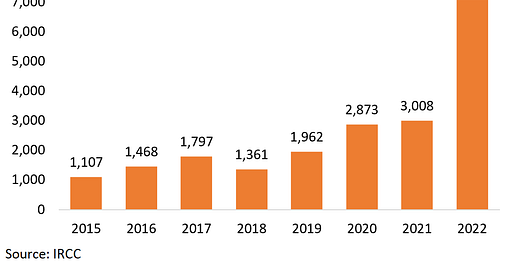Given the state of the New Brunswick workforce these days, I think there is an important role for temporary foreign workers (TFWs). For a number of years, Ontario, Quebec and BC have relied heavily on TFWs as agricultural labourers. The process has matured - the work is done through country consulates. Workers come in. They do their job - 6 weeks, 20 weeks, whatever - then they go home. Win-Win. Most of them don’t want to move here. They earn more in a couple of months here than in a year in their home country.
In my opinion, when there is a clear need for temporary workers for agriculture, fish processing, etc. it should be part of an overall workforce plan. I would say tourism should fit into the mix as well.
Right now, the vast majority of TFWs in New Brunswick support the fish processing sector. The province saw a substantial increase in 2022 - rising more than double compared to 2021. There were over 2,128 TFWs in 2022 in New Brunswick, or 3% of the national total (well above our ‘share’).
And the location of these TFWs makes it clear that most are related to fish processing.
*Includes Baie-Sainte-Anne
There have been times when employers have used the TFW program with the goal of keeping workers long term - this has moderated some since the Atlantic Immigration program came into effect.
The age old question is whether or not we can boost labour market participation among New Brunswickers and/or get ‘occupational pluralism’ where seasonal workers take on 2 or even more seasonal roles.
Other than that, the strategic use of TFWs to meet strictly seasonal demand will be important in the years ahead. If a lack of TFWs means we cannot develop agriculture, tourism and other opportunities, that would be a shame.





I worked in Germany for seven years, and have a lot of experience with their "Gastarbeiter" system. I worked with people from Turkey, Greece, and Arab countries in North Africa. Most of Europe is part of this system of people living where they are happiest and working where their skills are needed. They work hard, harder than most local people want to, but they spend several months every year where they are most comfortable. It certainly is a win-win situation for everyone, and I know that Germany is past resentment of their 'guest workers.' It's a new world we live in and the rules are changing fast. People are demanding to work and live where they want ot, despite the efforts of the ludites who insist on fighting change.
The TFW program needs serious overhaul to address the rampant abuse that takes place within it before we should consider expansion. Expanding to the construction sector also seems like a bandaid solution when we should be focusing on developing local capacity to build.